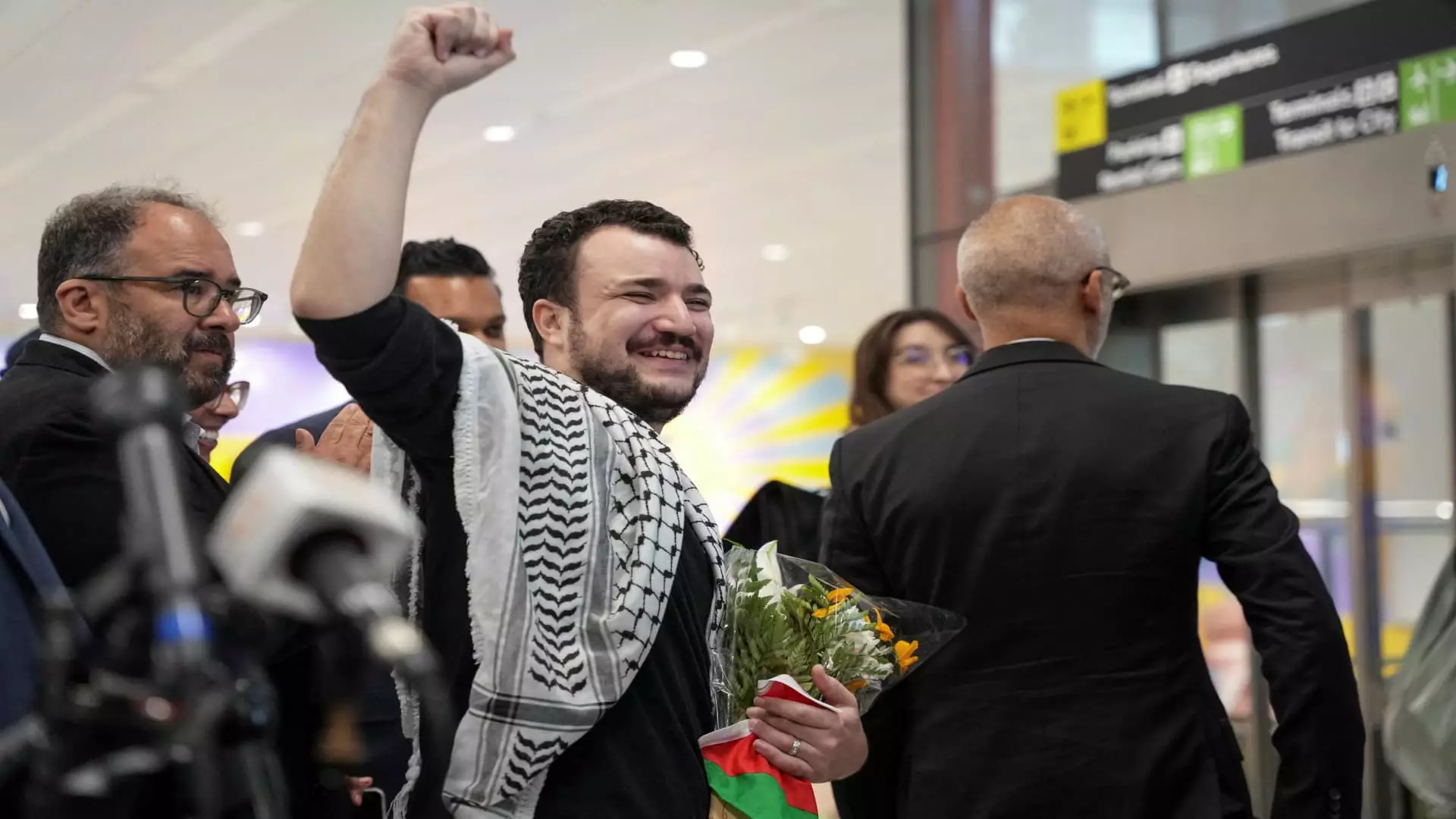Mahmoud Khalil, a spirited 30-year-old Columbia University student, has emerged from over three months in ICE detention, yet his battle is far from over. Khalil was apprehended in March for protesting the U.S. government’s support of Israel amid the devastating conflict in Gaza. As he returned to Newark International Airport filled with emotion, surrounded by supporters including Rep. Alexandria Ocasio-Cortez, he uttered powerful words that echoed beyond the confines of his personal experience: “Even if they would kill me, I would still speak up for Gaza.” His unwavering stance highlights not only his personal resilience but also the systemic issues at play in a government that seems increasingly inclined to silence dissent.
Khalil’s ordeal paints a stark picture of how immigration laws can be wielded as tools of political repression. His remarks resonate deeply in a landscape where political speech, particularly pro-Palestinian perspectives, faces aggressive pushback. It is a microcosm of a greater issue: the precarious nature of free speech in an era where the government appears willing to sacrifice constitutional liberties under the guise of national security.
The Role of Government and Institutions
The U.S. government’s claim that Khalil’s presence posed a national security threat is not only absurd—it’s chilling. Using an archaic provision from the Immigration and Nationality Act, the administration sought to justify detaining a graduate student who merely expressed his political beliefs. The lengths to which government officials will go to stifle dissent reveal a disconcerting trend towards authoritarianism disguised as security. Tricia McLaughlin from the Department of Homeland Security even criticized the judicial decision that freed Khalil, framing it as a threat to national security. This rhetoric is particularly troubling, as it casts a shadow over the independent judiciary, a cornerstone of democracy.
Khalil’s case is not an isolated incident but part of a disturbing trend where foreign academics and activists, particularly those advocating for Palestinian rights, find themselves targets of ICE amidst a substantial political outcry. The Trump administration’s aggressive stance towards dissenters like Khalil signals a troubling pivot away from respecting the rights of individuals—even those who are innocuously engaged in peaceful protest.
The Burden of Political Activism
Khalil’s eventual release, while celebrated, comes coupled with the harsh reality of his experience—a reality faced by many activists today. His statements post-release illuminate a world where dissent against governmental policies, especially those involving international injustice, is not merely frowned upon, but actively punished. Despite Khalil’s triumph over his unjust detention, advocates for justice must grapple with the idea that broader societal change remains elusive. Although Khalil celebrates his return, he aptly notes, “it’s long, very long overdue.”
Moreover, the implications of his imprisonment extend beyond his personal journey. Khalil is a reflection of the millions who fight tirelessly for social justice; however, in doing so, they expose themselves to dire consequences, stripped of the protection that should be afforded to every citizen advocating for equity. His persistence underscores a vital truth: activism is not without its perils, especially in a realm increasingly hostile to divergent viewpoints.
A Call to Action and Solidarity
In this fraught political climate, Khalil’s voice serves as a potent reminder that advocacy is essential, yet dangerous in its fragility. His defiance—a rallying cry against oppression and for Palestinian rights—encourages others to persist in their own battles against injustice. It is a call to action toward an inclusive future where open dialogue and diversity of thought are preserved, not persecuted.
Furthermore, Khalil’s struggle necessitates a united response from fellow citizens and civil rights organizations alike. An unwavering commitment to defending the rights of all individuals, regardless of their political beliefs, is paramount if democracy is to withstand the trials it faces. The judiciary and civil society must stand vigilant against the overreach of governmental power that seeks to stifle dissent in any form.
Khalil’s experiences illustrate the socio-political reality we inhabit—a world where the government could penalize activists for their beliefs, stifling dissent in the name of national security. As we reflect on Khalil’s journey, we must acknowledge that injustice anywhere is a threat to justice everywhere. The struggle for free speech and against oppressive forces continues to demand both resilience and collective action.


Leave a Reply